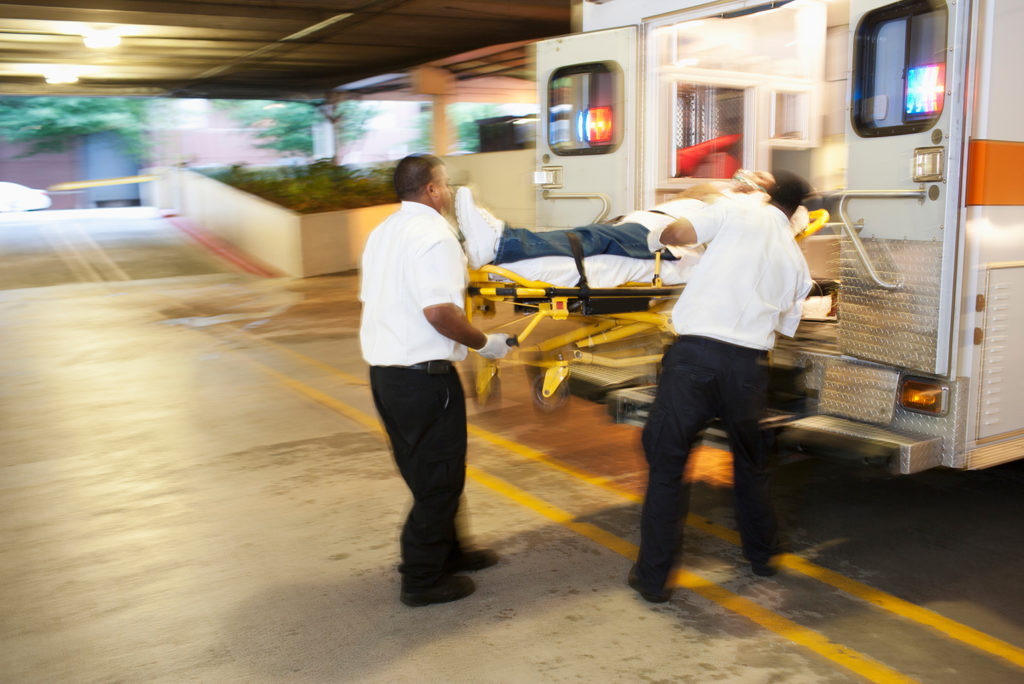Election 2018
Will Proposition 11 Mean Less Rest for Ambulance Crews?
Supporters describe Proposition 11 as necessary to ensure public safety, but EMT workers describe grueling 12-hour shifts in which crew members can often go eight hours without having a chance to stop for food.

California’s Proposition 11, which seeks to rewrite California’s Labor Code as it relates to rest and meal breaks for private-sector ambulance employees, might appear to be a strange ballot measure, even for a state that has seen its share of odd propositions. It has no opponent listed on the state’s official voter guide, and the only backer of the proposition, American Medical Response, is a company headquartered in Colorado, which has spent $22 million to secure the bill’s passage. Prop. 11 seems like it must have an interesting backstory, and it does.
More Ballot Measure Stories Here
That story begins with a California Supreme Court ruling in 2016, Augustus v. ABM Security, which found that private security guards were required to be given uninterrupted rest breaks by their employer. Guards for ABM had been instructed to keep their pagers on during breaks and to respond to calls for assistance, a practice that the court ruled was in violation of state labor law.
Like security guards, the state’s private sector emergency medical technicians (EMTs) and paramedics are on call during breaks — and they have filed lawsuits against private companies, including American Medical Response, over the practice. According to the California Legislative Analyst, those suits, after Augustus, are likely to be successful. The analyst’s report estimates that to be in compliance with Augustus and offer uninterrupted breaks to their employees, companies would need to hire about 25 percent more ambulance crews, at a potential cost of more than $100 million per year. Then there’s the class action lawsuit against AMR, which is the largest private ambulance company in California. Prop. 11 seeks to nullify the lawsuit.
Prop. 11 comes after last year’s failure of Assembly Bill 263, which sought a solution to emergency workforce staffing. The bill, which was supported by the union that represents emergency medical services (EMS) workers, and opposed by AMR, would have created a carve-out in the labor code for private ambulance companies, allowing them to require workers to be on call during breaks and respond to emergencies that demand the use of sirens and emergency lights. “We wanted to create a policy that protects workers’ rights, allows a little bit of [time] to get meals, but still protects public safety,” said Jason Brollini, the president-executive director of United EMS Workers, a local of the American Federation of State, County and Municipal Employees. (Disclosure: AFSCME is a financial supporter of this website.)
What the proposed bill wouldn’t have done was shield AMR from previously filed lawsuits now before the court. “We weren’t willing, through the stroke of the pen, to take away the ability of workers to seek redress in court,” Brollini said.
Supporters describe Proposition 11 as necessary to ensure public safety and provide lifesaving assistance. “If Prop. 11 does not pass, first responders will not be able to keep their radios on during breaks, putting patient care at risk,” said Marie Brichetto, a Yes on Prop. 11 spokesperson. “Prop. 11 would simply continue the longstanding practice of paying private EMTs and paramedics to be on-call during breaks — just like other first responders, including police and fire.”
Brollini disputed the notion that response times will increase if Prop. 11 fails, noting that such times are mandated by contracts between private companies and the counties they serve. “There is not a provider in the state that is going to turn their radios off,” he said. “What we do need is some kind of relief.”
Although his union didn’t file paperwork in time for its opposition to Prop. 11 to be included in the state’s voter guide, Brollini says his own opposition is grounded in his 25-year career as an EMT worker, most of it spent working in an AMR ambulance. He described grueling 12-hour shifts in which workers can often go eight hours without having a chance to stop for food. Unlike police or firefighters, he said, they frequently don’t have stations at which to recuperate, exacerbating an already heavy workload.
In 2015, a survey published in the Journal of Emergency Medical Service found that first responders are 10 times more likely to attempt suicide than the general public. And a joint report in 2017 by the University of California, Berkeley and UCLA’s Labor Center reported that one-third of California’s EMTs and paramedics are low-wage workers, defined as earning less than $13.63 an hour, or two-thirds of the state median.
“We want to see our companies profitable,” Brollini said, “but we don’t want it to be at the expense of the worker’s mental and physical health.”
Copyright Capital & Main

-

 Column - State of InequalityJanuary 29, 2026
Column - State of InequalityJanuary 29, 2026Are California’s Billionaires Crying Wolf?
-

 Latest NewsFebruary 3, 2026
Latest NewsFebruary 3, 2026Amid the Violent Minnesota Raids, ICE Arrests Over 100 Refugees, Ships Many to Texas
-

 Dirty MoneyJanuary 30, 2026
Dirty MoneyJanuary 30, 2026Amid Climate Crisis, Insurers’ Increased Use of AI Raises Concern For Policyholders
-

 Featured VideoFebruary 4, 2026
Featured VideoFebruary 4, 2026Protesters Turn to Economic Disruption to Fight ICE
-

 The SlickFebruary 2, 2026
The SlickFebruary 2, 2026Colorado May Ask Big Oil to Leave Millions of Dollars in the Ground
-

 Column - State of InequalityFebruary 5, 2026
Column - State of InequalityFebruary 5, 2026Lawsuits Push Back on Trump’s Attack on Child Care
-

 Column - California UncoveredFebruary 6, 2026
Column - California UncoveredFebruary 6, 2026What It’s Like On the Front Line as Health Care Cuts Start to Hit
-

 The SlickFebruary 10, 2026
The SlickFebruary 10, 2026New Mexico Again Debates Greenhouse Gas Reductions as Snow Melts

